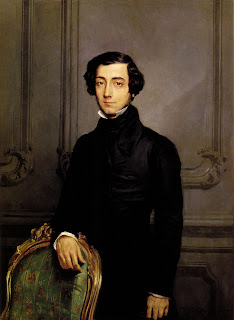
Alexis de Tocqueville was a French Political thinker that revolutionized the conception of democracy in the United States of America. He wrote about the democracy in the United States as a example to be followed by European governments.
Concerning the tyranny of the majority, de Tocqueville argues that there is little toleration of difference of opinion in democratic societies. Unlike in aristocratic societies, public opinion is seen as authentic rather than ascribed, and therefore has a great deal more moral force.
He argues that In USA, the government is exposed to the whims of the majority. Particularly in the legislature, which is elected at short intervals,representatives must act on public opinion in order to stay in office.
Furthermore, "the moral authority of the majority is partly based on the notion that there is more intelligence and wisdom in a number of men united than a single individual, and that the number of legislators is more important that their quality".
Yet another principle ensures the moral power of the majority. It is that "the interests of the many are to be preferred to those of the few".
A danger of democracy is that it can crush independence of thought:
"I know of no country in which, speaking generally, there is less independence of mind and true freedom of discussion than in America [...] As long as the majority is still undecided, discussion is carried on; but as soon as its decision is irrevocably pronounced, everyone is silent, and the friends as well as the opponents of the measure unite in assenting to its propriety "
In Europe, a person at odds with a repressive government can usually find shelter somewhere. If their opinion is at odds with an aristocratic government, then they can usually find security with the general populace. If it is at odds with the populace, the opposite is true.
The censure delivered on dissenters is much harsher in democratic societies than in aristocratic societies. In aristocratic societies one is tortured and punished but one's soul escapes. In democratic societies, "the body is left free and the sould enslaved":
“The sovereign can no longer say, “You shall think as I do on pain of death”: but he says, “You are free to think differently from me, and to retain your life, your property, and all that you possess; but if such be your determination, you are henceforth an alien along your people. You may retain your civil rights, buy they will be useless to you, for you will never be chosen by your fellow-citizens, if you solicit their suffrages; and they will affect to scorn you, if you solicit their esteem. You will remain among men, but you like an impure being; and those who are mostly persuaded of your innocence will abandon you too, lest they should be shunned in their turn."
Given this overwhelming moral power of "majority opinion", its ability to ostracise, and its tendency to enforce conformity, it is possible that the average person may simply abdicate responsibility for taking part in political debate and accept majority opinion as his own. De Tocqueville argues that this is a fault of democracy in general, rather than democracy in America.
Tocqueville states that "unlimited power is itself a bad and dangerous thing. Human beings are not competent to exercise it with discretion." Only God, in his perfection, is fit to exercise such power. When absolute command is conferred on any power, there is a germ of tyranny. The main problem with the democratic insitutions of the United States comes their irresistible strength. "I am not so much alarmed at the excessive liberty which reigns in that country as at the inadequate securities which one finds there against tyranny."
If a party is wronged, the only entity that one can turn to is the majority. The majority controls the legislature, the executive and courts.
"If the free institutions of America are destroyed, that event may be attributed to the omnipotence of the majority, which may at some future time urge the minorities to desperation and oblige them to have recourse to physical force.".
Tocqueville cites Madison's Federalist 51, where Madison states his opinion on faction. He states that it is of paramount importance to protect the weak against the strong, and prevent the oppresion of fractious majorities. Madison argues that the real danger is the tyranny of the legislature, which is so exposed to the whims of the majority.
An Example of the Tyranny of the Majority
In the chapter "The Unlimited Power of the Majority", De Tocqueville cites two examples of the tyranny of the majority.
During the war of 1812, a newspaper in Baltimore had taken the opinion of the other side, and "excited the indignation of the inhabitants". The mob attacked printing presses, the militia was called out, but did not respond. The only way of saving those threatened was to throw them into prison. The prison was then forced upon and the editors killed. The guilty were acquitted.
The other example is that of black voters. The blacks were ostensibly allowed to vote, but De Tocqueville is told that they "volutarily abstain from making their appearance" at the voting booth, because they are afraid of being bullied or mistreated.
"The law is sometimes unable to maintain its authority without the support of the majority".
The majority, De Tocqueville concludes, have the right not only to make the laws, but to break them as well. It is only another instance of the importance of mores and values.




No comments:
Post a Comment